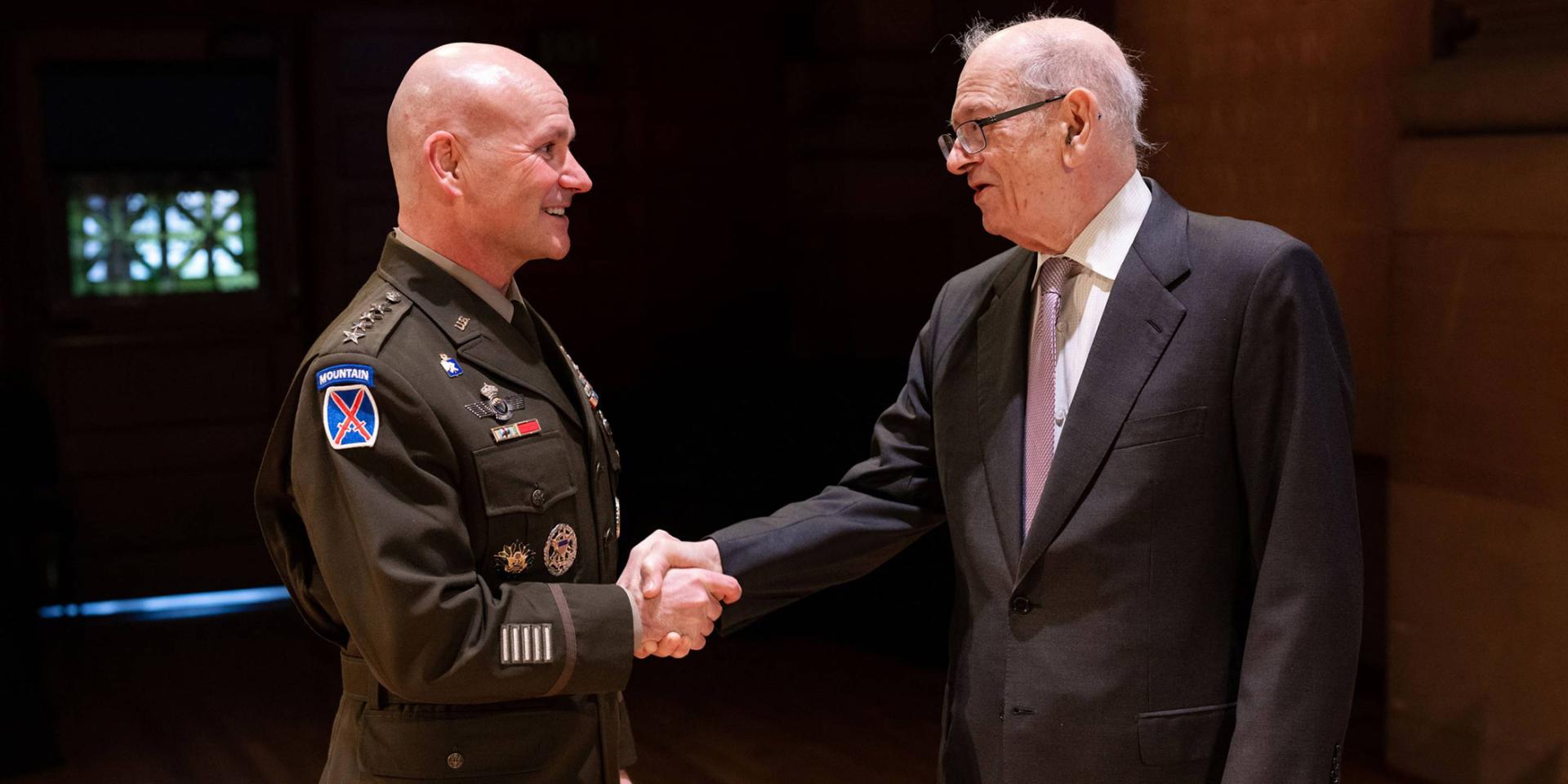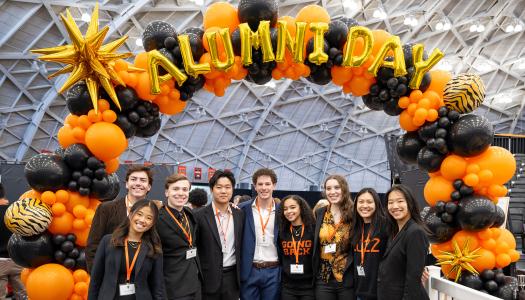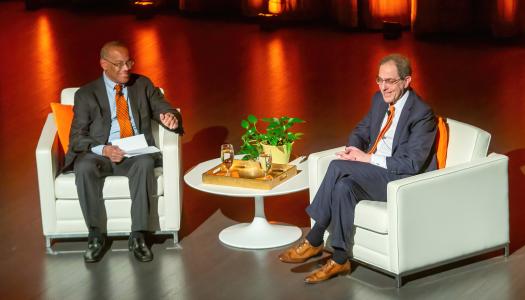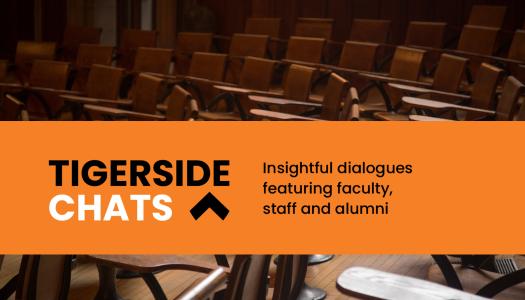Photo by Sameer A. Khan/Fotobuddy
Princeton gave top alumni honors to four-star general Christopher Cavoli ’87 and internet pioneer Robert Kahn *64 on Saturday, Feb. 25, during an Alumni Day program that showcased the many ways alumni and students exemplify being “in the nation’s service and the service of humanity.”
More than 1,000 alumni, faculty, staff, students and guests attended the annual mid-winter gathering on campus. The 108th Alumni Day also included top prizes for undergraduate and graduate students, the Service of Remembrance memorial ceremony, and celebrations of the 50th anniversaries of the Association of Black Princeton Alumni and the Fields Center for Equality and Cultural Understanding. Highlights from the day and award winner speeches are available on Princeton’s YouTube.
Cavoli receives Wilson Award
Cavoli, who participated in Princeton ROTC and earned a bachelor’s degree in biology, received the Woodrow Wilson Award. He spoke of how Princeton’s service motto has influenced his military career in the United States, Europe, Asia and Afghanistan.
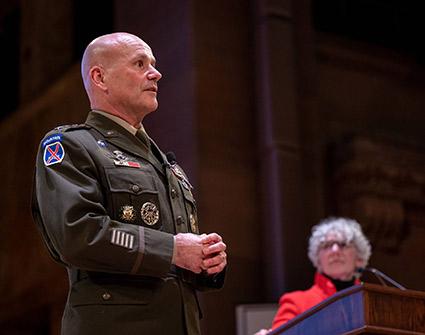
“Princeton has been such an important part of my life. I can’t think of any other award that I would rather receive,” Cavoli told a packed audience in Richardson Auditorium. “It is a place of beauty, a place of challenge, a place where young people come and learn to think. It is a place where we all came and we fell in love because here we could live a vibrant life of the mind. It was a place where we met people from all walks of life and from all over the world.”
Cavoli has served in the Army for 35 years. He assumed duties as Commander, U.S. European Command, and as the Supreme Allied Commander Europe in July 2022. “He embodies a spirit of courage in his defense of democracy and of service in his willingness to lead,” Dean of the College Jill Dolan said in her introduction.
“Life of military service is not an easy life,” Cavoli said. “I wasn’t alone. Other Princetonians were out there doing similar things in service and in the military. …We came out of this school and we chose this life. It’s a life that shaped us. We saw suffering. We learned about death. We learned about heartache.”
Reflecting on the experience of war, he continued: “I remember feeling the deep, deep responsibility of leading soldiers. … I learned the value of their service and their sacrifice.”
Cavoli then turned to the challenges of today, noting the one-year anniversary of Russia’s “brutal invasion” of Ukraine. “The Ukrainians inspire us with their bravery, with their determination and with their commitment. They inspire us with their service,” he said.
We must all work to defend freedom and liberty throughout the world, said Cavoli.
“We cannot take it for granted. It won’t be easy. It will require strength, it will require focus, it will require thoughtful, creative people who do not tire and who do not despair, who do not falter. It will require people who put the needs of others above their own,” Cavoli said. “Today, in our world …Princetonians in service are badly needed.”
Kahn awarded Madison Medal
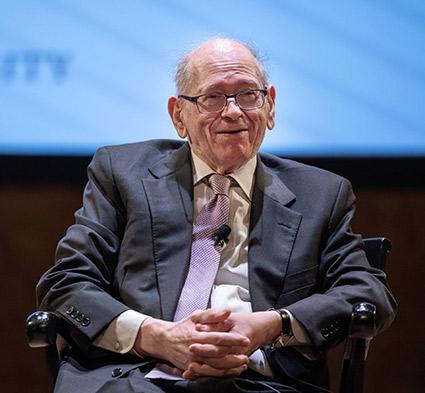
Kahn, who earned a Ph.D. in electrical engineering, was given the James Madison Medal. Kahn has been called a “father of the internet.” He and computer scientist Vinton Cerf created the protocol to transmit data reliably between separate computer networks, and to do so quickly, effectively and routinely.
“A forward-thinking visionary whose work ushered in not only a technological revolution but also a new way of communicating, Dr. Kahn has worked tirelessly to connect us all through a common language,” Dean of the Graduate School Rodney Priestley said in his introduction.
Today, Kahn is chairman, CEO and president of the Corporation for National Research Initiatives (CNRI), a non-profit focused on research and development of the National Information Infrastructure, also known as the information superhighway.
Much of Kahn’s career was spent at the U.S. Defense Advanced Research Projects Agency (DARPA) and also at a small engineering firm that worked on ARPANET (Advanced Research Projects Agency Network), an experimental computer network sponsored by DARPA. His many honors include the 2005 Presidential Medal of Freedom.
“My career has involved many years in public service supporting research, but I’ve also had the privilege of helping to create innovative information infrastructure for the research community, for the military and ultimately for all of society,” Kahn said.
He added: “My advisers at Princeton and the educational experience that was afforded to me played a key role in that journey, as it reinforced and greatly expanded my ability to think critically about technology and systems.”
These skills helped him problem solve and innovate, Kahn said. He went on to share highlights from the early days of the internet’s development as well as his work on the Voice over Internet Protocol and the Digital Object Architecture project.
“Thank you for enabling me to call Hong Kong last night using WhatsApp on my cell phone,” one alumnus said to Kahn during a question-and-answer session, as the audience broke out in applause.
Kahn was also recognized for his contributions to Princeton, as Priestley noted his “profound impact” as an adviser to the Department of Computer Science, which has helped establish the University as a leader in the field.
“I really appreciate receiving the James Madison medal from Princeton and I look forward to many more years of productive interactions with the University and its faculty and students,” Kahn concluded.
Student awards and Service of Remembrance

Alumni Day also traditionally includes the recognition of top honors for undergraduate and graduate students, as well as the Service of Remembrance in the University Chapel.
During the morning program in Richardson Auditorium, Class of 2023 members Austin Davis and Ella Gantman received the Pyne Prize and graduate students Binyamin “Benny” Kleinman, Jason Molesky, Mira Nencheva and Lila Rodgers were recognized for winning the Jacobus Fellowship.
Davis and Gantman also gave brief remarks, reflecting on how Princeton has shaped them and helped them grow.
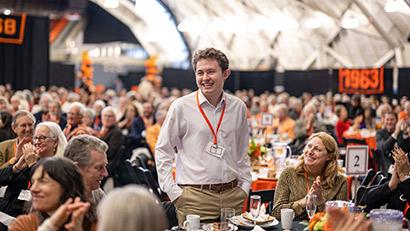
“Over the last four years the most valuable thing I have developed during my time at Princeton is the full and unapologetic use of my voice. The unfettered ability to stand up for what I believe is right,” Gantman said. “My time at Princeton has also taught me that once you have established your own platform, your own voice, it is your responsibility to use that privilege to amplify the voices of others. To uplift those who are silenced and empower them to tell their stories.”
Davis expressed gratitude for the faculty, staff and students with whom he’s worked in the Department of History, Undergraduate Student Government and the Emma Bloomberg Center for Access and Opportunity.
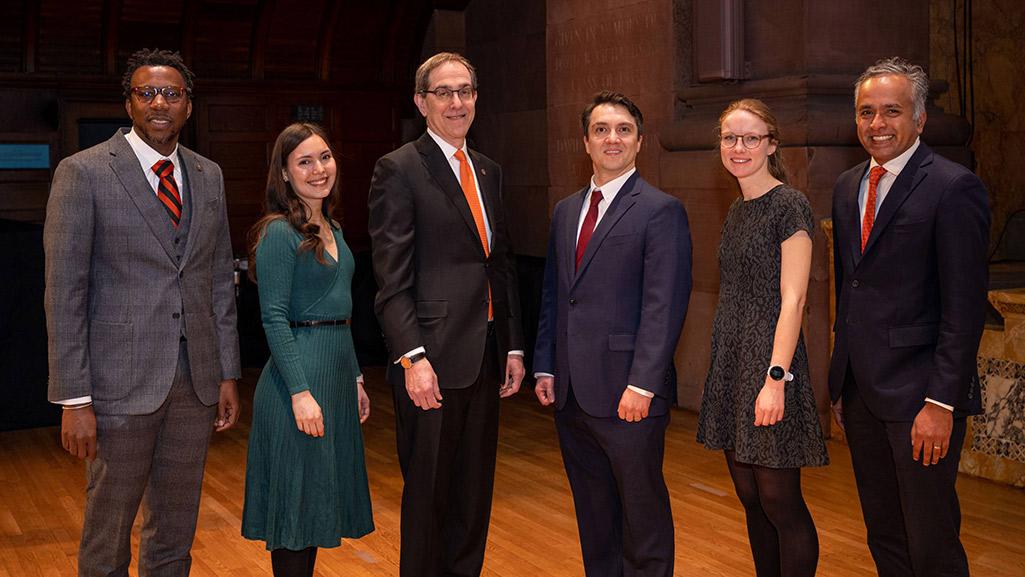
“Princeton touts its resources and opportunities, but the real magic are the people who make it all work, who stick their neck out every day for me and other students,” he said. “The people at [the Emma Bloomberg Center] have taught me how to look at life with an equity focus, to uplift others and build a strong community, and to stick my neck out for my peers so that they can prosper at Princeton.”
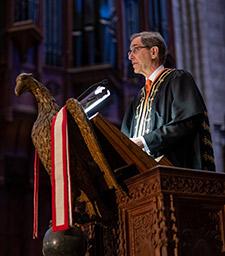
In the afternoon, the University community gathered to honor alumni, faculty, staff and students who had died in 2022. This year, President Christopher L. Eisgruber, who usually dedicates the memorial wreath during the service, also delivered a short address commemorating the six young people — four undergraduates, one graduate student and one staff member — who had died since last May.
“The premature passing of any person is a terrible loss for a close-knit university community. To lose six in one academic year is devastating,” Eisgruber said. “May we honor the memory of all who are no longer with us by recommitting ourselves to the daily acts of empathy and compassion that nourish the Princeton community and enable our healing.”
The day closed with a reception in Chancellor Green Rotunda as alumni said their farewells, looking forward to gathering again at Reunions in May or sooner.
